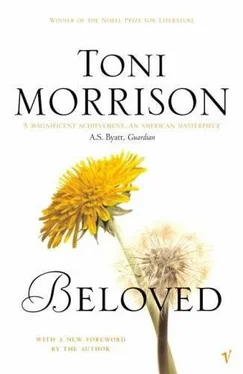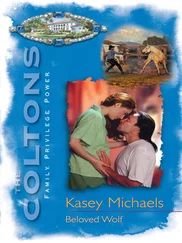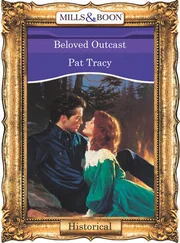It is sprinkling now. A teasing August rain that raises expectations it cannot fill. He thinks he should have sung along. Loud something loud and rolling to go with Sixo's tune, but the words put him off- he didn't understand the words. Although it shouldn't have mattered because he understood the sound: hatred so loose it was juba.
The warm sprinkle comes and goes, comes and goes. He thinks he hears sobbing that seems to come from Mrs. Garner's window, but it could be anything, anyone, even a she-cat making her yearning known. Tired of holding his head up, he lets his chin rest on the collar and speculates on how he can hobble over to the grate, boil a little water and throw in a handful of meal. That's what he is doing when Sethe comes in, rain-wet and big-bellied, saying she is going to cut. She has just come back from taking her children to the corn.
The whites were not around. She couldn't find Halle. Who was caught? Did Sixo get away? Paul A?
He tells her what he knows: Sixo is dead; the Thirty-Mile Woman ran, and he doesn't know what happened to Paul A or Halle. "Where could he be?" she asks.
Paul D shrugs because he can't shake his head.
"You saw Sixo die? You sure?"
"I'm sure."
"Was he woke when it happened? Did he see it coming?"
"He was woke. Woke and laughing."
"Sixo laughed?"
"You should have heard him, Sethe."
Sethe's dress steams before the little fire over which he is boiling water. It is hard to move about with shackled ankles and the neck jewelry embarrasses him. In his shame he avoids her eyes, but when he doesn't he sees only black in them-no whites. She says she is going, and he thinks she will never make it to the gate, but he doesn't dissuade her. He knows he will never see her again, and right then and there his heart stopped.
The pupils must have taken her to the barn for sport right afterward, and when she told Mrs. Garner, they took down the cowhide.
Who in hell or on this earth would have thought that she would cut anyway? They must have believed, what with her belly and her back, that she wasn't going anywhere. He wasn't surprised to learn that they had tracked her down in Cincinnati, because, when he thought about it now, her price was greater than his; property that reproduced itself without cost.
Remembering his own price, down to the cent, that schoolteacher was able to get for him, he wondered what Sethe's would have been.
What had Baby Suggs' been? How much did Halle owe, still, besides his labor? What did Mrs. Garner get for Paul F? More than nine hundred dollars? How much more? Ten dollars? Twenty? Schoolteacher would know. He knew the worth of everything. It accounted for the real sorrow in his voice when he pronounced Sixo unsuitable.
Who could be fooled into buying a singing nigger with a gun? Shouting Seven-O! Seven-O! because his Thirty-Mile Woman got away with his blossoming seed. What a laugh. So rippling and full of glee it put out the fire. And it was Sixo's laughter that was on his mind, not the bit in his mouth, when they hitched him to the buckboard.
Then he saw Halle, then the rooster, smiling as if to say, You ain't seen nothing yet. How could a rooster know about Alfred, Georgia?
"HOWDY."
Stamp Paid was still fingering the ribbon and it made a little motion in his pants pocket.
Paul D looked up, noticed the side pocket agitation and snorted.
"I can't read. You got any more newspaper for me, just a waste of time."
Stamp withdrew the ribbon and sat down on the steps.
"No. This here's something else." He stroked the red cloth between forefinger and thumb. "Something else."
Paul D didn't say anything so the two men sat in silence for a few moments.
"This is hard for me," said Stamp. "But I got to do it. Two things I got to say to you. I'm a take the easy one first."
Paul D chuckled. "If it's hard for you, might kill me dead."
"No, no. Nothing like that. I come looking for you to ask your pardon. Apologize."
"For what?" Paul D reached in his coat pocket for his bottle.
"You pick any house, any house where colored live. In all of Cincinnati. Pick any one and you welcome to stay there. I'm apologizing because they didn't offer or tell you. But you welcome anywhere you want to be. My house is your house too. John and Ella, Miss Lady, Able Woodruff, Willie Pike-anybody. You choose. You ain't got to sleep in no cellar, and I apologize for each and every night you did. I don't know how that preacher let you do it. I knowed him since he was a boy."
"Whoa, Stamp. He offered."
"Did? Well?"
"Well. I wanted, I didn't want to, I just wanted to be off by myself a spell. He offered. Every time I see him he offers again."
"That's a load off. I thought everybody gone crazy."
Paul D shook his head. "Just me."
"You planning to do anything about it?"
"Oh, yeah. I got big plans." He swallowed twice from the bottle.
Any planning in a bottle is short, thought Stamp, but he knew from personal experience the pointlessness of telling a drinking man not to. He cleared his sinuses and began to think how to get to the second thing he had come to say. Very few people were out today.
The canal was frozen so that traffic too had stopped. They heard the dop of a horse approaching. Its rider sat a high Eastern saddle but everything else about him was Ohio Valley. As he rode by he looked at them and suddenly reined his horse, and came up to the path leading to the church. He leaned forward.
"Hey," he said.
Stamp put his ribbon in his pocket. "Yes, sir?"
"I'm looking for a gal name of Judy. Works over by the slaughterhouse."
"Don't believe I know her. No, sir."
"Said she lived on Plank Road."
"Plank Road. Yes, sir. That's up a ways. Mile, maybe."
"You don't know her? Judy. Works in the slaughterhouse."
"No, sir, but I know Plank Road. 'Bout a mile up thataway."
Paul D lifted his bottle and swallowed. The rider looked at him and then back at Stamp Paid. Loosening the right rein, he turned his horse toward the road, then changed his mind and came back.
"Look here," he said to Paul D. "There's a cross up there, so I guess this here's a church or used to be. Seems to me like you ought to show it some respect, you follow me?"
"Yes, sir," said Stamp. "You right about that. That's just what I come over to talk to him about. Just that."
The rider clicked his tongue and trotted off. Stamp made small circles in the palm of his left hand with two fingers of his right. "You got to choose," he said. "Choose anyone. They let you be if you want em to. My house. Ella. Willie Pike. None of us got much, but all of us got room for one more. Pay a little something when you can, don't when you can't. Think about it. You grown. I can't make you do what you won't, but think about it."
Paul D said nothing.
"If I did you harm, I'm here to rectify it."
"No need for that. No need at all."
A woman with four children walked by on the other side of the road. She waved, smiling. "Hoo-oo. I can't stop. See you at meeting."
"I be there," Stamp returned her greeting. "There's another one," he said to Paul D. "Scripture Woodruff, Able's sister. Works at the brush and tallow factory. You'll see. Stay around here long enough, you'll see ain't a sweeter bunch of colored anywhere than what's right here. Pride, well, that bothers em a bit. They can get messy when they think somebody's too proud, but when it comes right down to it, they good people and anyone will take you in."
"What about Judy? She take me in?"
"Depends. What you got in mind?"
"You know Judy?"
"Judith. I know everybody."
"Out on Plank Road?"
"Everybody."
"Well? She take me in?"
Stamp leaned down and untied his shoe. Twelve black buttonhooks, six on each side at the bottom, led to four pairs of eyes at the top. He loosened the laces all the way down, adjusted the tongue carefully and wound them back again. When he got to the eyes he rolled the lace tips with his fingers before inserting them.
Читать дальше











